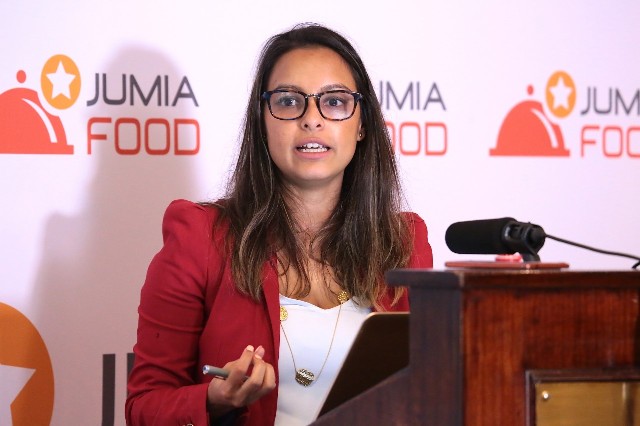
NAIROBI, Kenya Feb 21 – She dares it all.
Shreenali Ruparelia does not shy away from going into the deep end of an economic turmoil neither does her vision gets impaired at the sight for success, all in pursuit of a leeway to build a business empire.
The 31-year-old Managing Director of Jumia Food East Africa – a unit of the New York-listed e-commerce platform Jumia Technologies – gives Capital Business a sit-down to talk about her ‘never-give-up’ attitude, what it takes to become a young successful executive and the dos and don’ts of career climbing.
The company was started in Africa in 2012 and delivers food and drink in 11 African countries.
It has about a million customers in 30 African cities including Nigeria’s Lagos and Morocco’s Casablanca, with Kenya its biggest market yet.
The company initially targetted the middle-class who could afford internet access. However, growing smartphone use and plummeting data costs have opened up the market to lower-income earners who have been included in the target base.
Ruparelia divulges that her career journey has not been smooth but through taking up challenges, she has managed to get where she is.

“My career did not go the traditional way, it really bounced here and there, and sometimes I wondered where is this headed? That is part of the process, you have to be willing to be open to taking roles and responsibility that scare you the most, those will give you the biggest learning.”
Since taking up the role, the executive said some of her constant challenges include striving to strike a balance between an extremely demanding job and maintaining a healthy social life. She says she tries to not get bogged down by the day to day life and does her best to stay ahead of what everyone else is doing.
Although she notes that she never gets a hard time for being a young woman holding a senior position, the Jumia food MD said that sometimes, she gets the “you are too young to run this” opinion.
“But I am encouraged by the fact that some of our largest markets are also run by women. Additionally, a lot of our team members are women, which however is not on purpose,” she says while laughing heartily.
Ruparelia notes that she is not a micromanager but practices slight levels of it with some bit of caution not to show doubt in the ability of her employees to perform.
“With the team: I always check-in and listen to how they are doing. They are the ones who will tell you whether you are going right or wrong,” she said.
We asked the MD what it takes to be the best at what you need and she said;
- A high emotional intelligence (EQ) is vital to be able to connect with my team and the various partners we work with on a daily basis.
- Having the humility to know that to go fast, you go alone, but to go far, you go together.
- Courage and resilience to make tough decisions accept responsibility and survive the storm.
Having over ten years’ experience working across East Africa, Australia, and New Zealand, Ruparelia takes pride in having been part of the team that established Jumia Food which is a pioneer and a market leader in Kenya.
Throughout her tenure at Jumia, Rupanelia has managed to grow services such as Jumia Party, which has become the largest alcohol delivery service provider in the market. Under her watch, the service has expanded in all major Kenyan cities.
Ruparelia also championed the launch of a grocery delivery service and Jumia Prime which has gained rapid recognition over time.
- On-Demand services

The Managing Director also debunks the myth that on-demand services are solely for the upper class; “We want to grow the narrative that on-demand services can be for everyone; mass-market customers, those willing to spend 250 and below can access Jumia food services and be granted local, cheap and healthy offers.
“On-demand services are all about improving and helping the lives of our consumers from all walks of life,” she said.
She also comments on the current economic turmoil which she says is hurting the business. Kenya’s economy is currently on a slow down, with World Bank lowering her growth prediction for the year to 5.6 percent from 2019’s 5.8 percent.
“We are currently experiencing the impact of the economy on our sales, which is worsened by the existing perception that the food delivery business is premium.
However, Ruparelia lauds the Government for creating a conducive environment and being more receptive to online businesses.
She said that the Uhuru Kenyatta-led government has been open to holding a dialogue with the private sector, to consider the many ways in which business is evolving in Kenya.
In regards to the ongoing Coronavirus epidemic in China, the MD notes that it has had an impact on the Jumia Group from a supply chain side considering the closure of some of the main containers in mainland China.
However, she notes that the firm has set up some contingency measures through planning and finding alternative products for its customers from its wide range of suppliers globally.
On the flip side, she hinted that the epidemic could be having a positive impact on the company’s operations as its main competitors, like Ali Baba and Ali Express rely heavily on supplies from China.
The virus was first diagnosed in Wuhan city in China late last year and has caused more than 2,000 deaths and infected more than 80,000.
Nonetheless, in the latest fourth-quarter earnings, the group’s operating losses widened by 15 percent to USD 66.5 million year-on-year while full-year operating losses expanded by 34 percent to USD 248 million.
According to the firm which is listed on the New York Stock Exchange (NYSE), the increased losses are mainly due to higher expenses, including fulfillment costs.
“We are starting to face some challenges to fulfill our cross border sales. Many of the sellers in our market place are starting to face procurement issues so this can affect both product viability and prices,” Jumia CEO Sacha Poignonnec was quoted by Quartz in reference to products sourced from China.



































